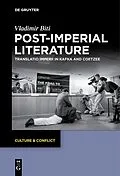This book proposes a new departure point for the investigation of transnational literary alliances: the traumatic constellation of translatio imperii, which followed the dissolution of the East-Central European empires in the 1920s and the crumbling of the West European colonial empires in the 1950s. To prevent their breakdown, the former transitioned from a 'sovereign' to a 'disciplinary' mode of administration of their peripheries, the latter from the merciless assimilation of their colonial constituencies to their affirmative regeneration. This book treats Franz Kafka as the writer of the first transition, prefiguring J. M. Coetzee as the writer of the second. In a series of close readings, it investigates the particular ways in which the restructuring of power relations between the agencies in their fictions is a response to the delineated post-imperial reconfiguration of the new countries' governmental techniques. By displacing their narrative authority beyond the reach of their readers, they laid bare the sudden withdrawal of transcendental guarantees from the world of human commonality. This entailed an unstable and elusive configuration of their fictional worlds as a key feature of post-imperial literature.
Autorentext
Vladimir Biti, University of Vienna, Vienna, Austria.
Zusammenfassung
Culture and conflict inevitably go hand in hand. The very idea of culture is marked by the notion of difference and by the creative, fraught interaction between conflicting concepts and values. The same can be said of all key ideas in the study of culture, such as identity and diversity, memory and trauma, the translation of cultures and globalization, dislocation and emplacement, mediation and exclusion. This series publishes theoretically informed original scholarship from the fields of literary and cultural studies as well as media, visual, and film studies. It fosters an interdisciplinary dialogue on the multiple ways in which conflict supports and constrains the production of meaning, on how conflict is represented, how it relates to the past and projects the present, and how it frames scholarship within the humanities.
Editors:
Isabel Capeloa Gil, Catholic University of Portugal, Lisbon, Portugal; Paulo de Medeiros, University of Warwick, UK, Catherine Nesci, University of California, Santa Barbara, USA.
Editorial Board:
Arjun Appadurai, New York University,
Claudia Benthien, Universität Hamburg,
Elisabeth Bronfen, Universität Zürich,
Bishnupriya Ghosh, University of California, Santa Barbara,
Joyce Goggin, Universiteit van Amsterdam,
Lawrence Grossberg, University of North Carolina at Chapel Hill,
Andreas Huyssen, Columbia University,
Ansgar Nünning, Universität Gießen,
Naomi Segal, University of London, Birkbeck College,
Márcio Seligmann-Silva, Universidade Estadual de Campinas,
António Sousa Ribeiro, Universidade de Coimbra,
Roberto Vecchi, Universita di Bologna,
Samuel Weber, Northwestern University,
Liliane Weissberg, University of Pennsylvania,
Christoph Wulf, FU Berlin,
Longxi Zhang, City University of Hong Kong
